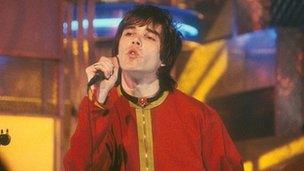Can Manchester music move on from its past?
- Published
- comments

The Stone Roses are set to play their first gigs together for 16 years
Manchester has produced some of Britain's best and most influential bands, and most of them are back this summer. As the oldies lumber back into action, are they threatening to cast a shadow over the next generation of rock 'n' roll stars?
On Saturday night, music fans in Manchester will party like it's 1989, when two of the biggest bands from the "Madchester" music scene, the Happy Mondays and Inspiral Carpets, play a comeback concert at the city's arena.
Next month, 225,000 people will watch the hotly anticipated return of The Stone Roses at three gigs in the city.
New Order are currently on the road, while their estranged bassist Peter Hook is playing Joy Division albums live, and planning a rave in the car park of the legendary Hacienda nightclub to mark its 30th anniversary.
Meanwhile, The Buzzcocks co-founder Howard Devoto is rejoining his bandmates for the first time in more than 30 years, and 1990s The Charlatans are playing their 1997 album Tellin' Stories in full on tour.
That is not to mention Take That's record-breaking stadium reunion tours.

The seven original members of The Happy Mondays have reformed after almost 20 years
Of the legendary Manchester bands of the 1970s, '80s and '90s, only The Smiths and Oasis still have hatchets to bury.
"We're proud of what we've achieved over the years and just at a time where we think we should celebrate it," says Inspiral Carpets drummer Craig Gill.
As well as playing with his band, Gill is a tour guide who takes fans to see the city's musical landmarks. Artists like New Order made history, he says.
"If anybody's got a right to be nostalgic about things, then it's people like that - people who were involved in the scene and are here to tell the tale. I think we should be grateful that people like that are still doing stuff and willing to celebrate what has been a great past 30 years in Manchester."
Many big-name Manchester musicians have helped nurture new bands, Gill says, and he cites <link> <caption>The Janice Graham Band</caption> <url href="http://janicegrahamband.com/" platform="highweb"/> </link> and <link> <caption>The Deadbeat Echoes</caption> <url href="http://soundcloud.com/deadbeat-echoes" platform="highweb"/> </link> - who recently supported the Inspirals - as proof that the local scene is still alive and kicking.
But will fans be paying to see them reform in another 20 years time?
Elbow are the biggest current Manchester band and have been in the limelight for more than 10 years. Otherwise, The Courteeners have played arenas and The Ting Tings have enjoyed chart success.
Pop nostalgia is certainly not just a Mancunian phenomenon - everybody from The Police to The Pixies have jumped on the reunion bandwagon over the past decade.
That has coincided with a drop in sales of current guitar music, sparking debate about the supposed "death of rock".
"There are probably more bands in Manchester now than there's ever been before," says John Robb, who wrote a book on the Stone Roses and, with his blog <link> <caption>Louder Than War</caption> <url href="http://louderthanwar.com/" platform="highweb"/> </link> , is a vocal champion of new music.
"Every kid seems to be in a band," he says. "You always read this stuff that guitar music's dead. You think, who is this in these rehearsal rooms I go to?
"There are bands crammed into the rooms. There's not one band per room, there's about 10 bands in each room.
"In the punk days there were probably 10-15 bands. But [now] you could probably find 2,000-3,000 good bands in town."
So why does it seem harder to break through?
Natalie-Eve Williams, who co-hosts Manchester Music and BBC Introducing on BBC Radio Manchester, says shifts in technology and the music industry mean it is more difficult to make an impact.
"There are bands out there that I'm confident are going to break through, but I do feel that the greats - those big rock 'n' roll bands that have this great big following and dominate the market - are a factor of yesteryear, sadly," she says.
"The whole record industry is nothing like it was over the last few decades."
Rather than relying on record labels, more people self-release material and compete to get noticed on the internet, she says.
"It's good in one way because it's very much more accessible, but also you don't get the huge budget behind you.

Dirty North were namechecked by Stone Roses drummer Reni in their reunion press conference
"Unless you've already reached a certain level, I don't think there's a lot of backing for new bands to go and do what Oasis or The Stone Roses did."
One new group who have been given a big leg up are <link> <caption>Dirty North</caption> <url href="https://twitter.com/#!/dirtynorth" platform="highweb"/> </link> , a self-proclaimed "rap reggae rock indie punk funk blues" band from Wythenshawe.
They have been given a support slot with The Stone Roses, after being championed by drummer Reni.
Dirty North frontman Johnny Gregory is clearly grateful for the platform, saying gig promoters and record labels are normally reluctant to take a chance on new bands.
"If you're not established, if you haven't got proof that you can sell out a venue, then, as far as they're concerned, they wouldn't risk losing the money," he says.
"But if you did give that band a chance to play, it might be a chance for them to get established. We're so lucky to be supporting the Stone Roses, and what's to say this won't show us to the UK for the band we are? We wouldn't have had that if it wasn't for the Stone Roses liking us. We wouldn't get that from the biggest music promoters or the biggest venues."
So does all the attention going on high-profile reunions overshadow the current scene?
"It does and it doesn't," Gregory replies, diplomatically. "If all these bands are reforming, then the attention will be on them and there will be less attention on the small indie night that's full of unsigned bands.
"No-one's going to write about that when they can write about the Happy Mondays reforming.
"However, the Stone Roses reforming has given us the biggest gig we've ever had. So I can't say that it's a bad thing."
- Published30 January 2012
- Published21 October 2011
- Published7 March 2011
- Published10 January 2011
- Published3 November 2010